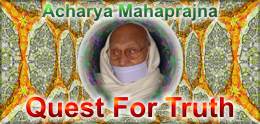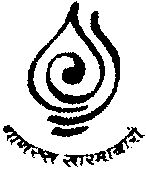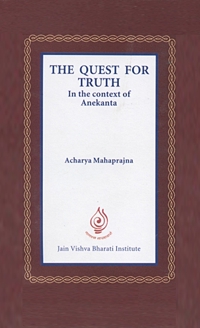
The sages have said in the Upanishads that if there were no sky, there would be no bliss. Where do you find bliss? Only if the cosmos is there, there is bliss.
In the same way Bhagvan Mahavira has said that if there were no dharmaastikay there would be no vibrations." You are asking and I am replying: this process is going on because of dharmaastikay. If it were not there you would neither be able to ask nor would I be able to answer. We would not even meet. Everything would remain in its original place. Our meeting, our speech, the meeting of our bodies, the mixing of objects, its movement, all this happens because of its motion from one place to another and all this happens on account of the substance of the medium of motion. It is rendering its service so quietly that no one has any complaints. It does not have consciousness and so there is neither the emotion of being beholden nor that of any bias. It is working in its own natural way."
Gautam asked, "Lord! What happens due to adharmaastikay?"
Bhagvan Mahavir replied, "You have just got back after meditating. Where was your mind then?" "Lord! Nowhere. I had blocked away my mind." Bhagvan Mahavir replied, "This blocking of the mind, concentration and stillness happen due to adharmaastikay. If that was not there, then the mind would not be able to concentrate, it would not be able to be silent and you would not be able to sit quiet closing your eyes, either. You would keep moving. There is constant movement in the infinite cosmos. We would never be able to return to where we began. We would get lost in the infinity of the cosmos. But contrary to our movement is our state of stillness. That is why we are stationed somewhere. In sustaining such a state, adharmastikaya helps in the same quiet way that dharmastikaya helps movement." Gautam asked, "What happens in the cosmos?" replied Bhagvan, "The existence of dharmastikay, adharmastikay, jivastikaya and pudgalastikaya is dependent on the existence of space. It supports all of them. In the same section of space where the dharmastikaya is, adharmastikaya, jivastikaya and pudgalastikaya exist. If space did not have the capacity to give this free room, then they would not exist together. In its absence, their existence would not be possible."
Gautam asked, "Lord! What does the jiva do?" Bhagvan said, "It acquires knowledge, it experiences. It has senses. Through these senses it sees, it listens, it smells, it tastes and touches. There is green colour before us. The eyes saw and its function is complete. Leaves rustled. The ears heard and its function was complete. The nose caught a smell in a whiff of wind and its work was complete. The tongue tasted the juice of a fruit and its work was done. The hands touched the trunk and its work was complete. But what has happened totally? Neither the eyes know nor the ears. That which collects all the experiences and gives them meaning is the mind. To the mind the colour, leaves, flower, fruit and bark are not separate entities but part of one tree. In the world of the senses they acquire independent identities but in the area of the mind they all become one. The mind thinks, reflects, imagines and remembers. The soul has intellect. It analyses the information received from the mind and makes decisions and has many such remarkable features. It acquires knowledge even without the information supplied by the mind and the senses. The senses, mind and intellect are all the material manifestations of the consciousness. That is why it knows through matter. It cannot perceive the object to be known about. Pure consciousness can perceive the objects of knowledge. As it does not require any medium for comprehension it is called direct knowledge or extra sensory knowledge. This entire world of knowledge falls within the ambit of the soul's capacity.
Gautam asked, "Lord what is the work of pudgal, matter?"
Mahavir said, "Man breathes, thinks, speaks, eats and all this is taking place on the basis of pudgal. This is the varjana (a special class of pudgal), which is utilized as breath. Similarly there is the varjana of the mind, which is utilized in the thinking process. So also the varjana of speech and nutrition are responsible for speaking and eating respectively. In the absence of these varjanas the process of thinking, breathing, speaking and eating would be impossible. All perceptible objects are nothing but varjanas or pudgal. Although pudgal astikay in itself has the same nature there are varieties of varjanas based on different functions. It can be understood with one example: A shepherd took his flock grazing. There were too many sheep so he decided to paint them in wild colours. This made his job easy. Even matter is divided in the same way. All that happens to the soul is because of matter. If there were no matter, nothing would happen. Everything would be inactive and inert."
 Acharya Mahaprajna
Acharya Mahaprajna


